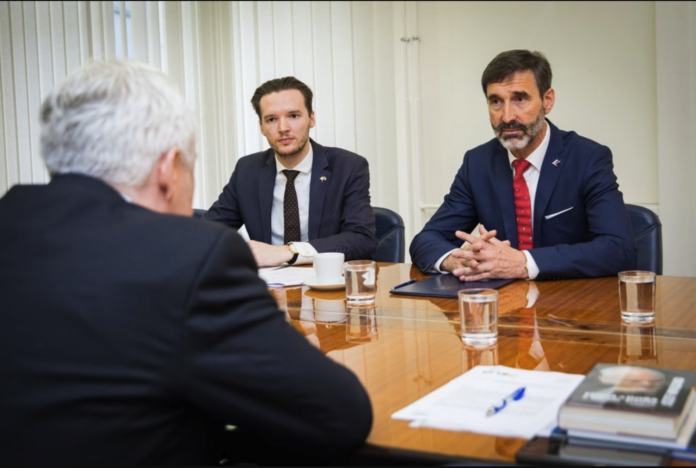Slovakia’s Foreign Minister, Juraj Blanár, faces a lawsuit after diplomat Ivan Novotný accused the ministry of denying him financial benefits and parental leave because he is gay. The Slovak National Centre for Human Rights (SNSĽP) confirmed the discrimination, but the ministry refuses to settle. Novotný and his husband, diplomat Metod Špaček, were the only openly gay couple in the ministry—until Špaček was removed from his post and later dismissed. Novotný was also fired under questionable circumstances. He now claims the ministry’s dismissals also targeted older employees and those with pro-Western views, with a collective lawsuit in preparation.
Ivan Novotný, a diplomat and legal expert, has filed an anti-discrimination lawsuit against the Ministry of Foreign Affairs, claiming he was denied financial benefits and additional parental leave due to his sexual orientation. The Slovak National Centre for Human Rights (SNSĽP) has confirmed that Novotný faced discrimination, yet the ministry refuses to acknowledge any wrongdoing or offer a settlement. If the court rules in Novotný’s favour, Slovakia could face international scrutiny over its treatment of LGBTQI+ employees in government institutions.
The case is part of a broader pattern of alleged political retaliation and misuse of power under Minister Juraj Blanár. Novotný and his husband, Metod Špaček, were the only openly gay couple in the ministry. Špaček, a seasoned diplomat, was set to become Slovakia’s ambassador to the UN in New York but had his appointment revoked after media reports framed his same-sex parenthood as controversial. Shortly thereafter, his position in the ministry was eliminated altogether. Novotný, too, was dismissed under the pretext of cost-cutting, despite the ministry hiring new staff at the same time.
Beyond their individual cases, Novotný alleges that the Foreign Ministry’s recent wave of dismissals targeted diplomats based on discriminatory factors, including age, health conditions, and political beliefs. Those with pro-Western and pro-Ukrainian views were reportedly among those disproportionately affected. A group of dismissed diplomats is preparing a collective lawsuit, which could expose a broader effort to reshape Slovakia’s diplomatic corps along ideological lines.
The ministry’s refusal to grant Novotný’s parental benefits raises legal concerns. Slovak law recognises foreign birth certificates, yet officials demanded additional legal verification of Novotný’s parental status—requirements not imposed on other employees. According to SNSĽP, this constitutes clear discrimination. Despite this, the ministry insists on additional documentation and continues to deny his claims.
The Foreign Ministry has avoided addressing the allegations directly, responding to media inquiries by citing privacy concerns. Meanwhile, domestic media coverage has played a role in shaping public perception of the case. The weekly Plus 7 dní previously published an article questioning whether a gay couple should raise a child while implying their diplomatic appointments were undeserved. Such narratives contribute to an environment where discrimination against LGBTQI+ individuals is normalised rather than challenged.
Novotný’s legal challenge could set a precedent for the enforcement of anti-discrimination laws in Slovakia. A ruling in his favour may compel the government to take accountability for its actions, while a ruling against him would raise concerns about the independence of Slovakia’s judiciary. Either way, the case is poised to become a major test of the country’s commitment to human rights and the rule of law.
Source: Miro Kern | Denník N



